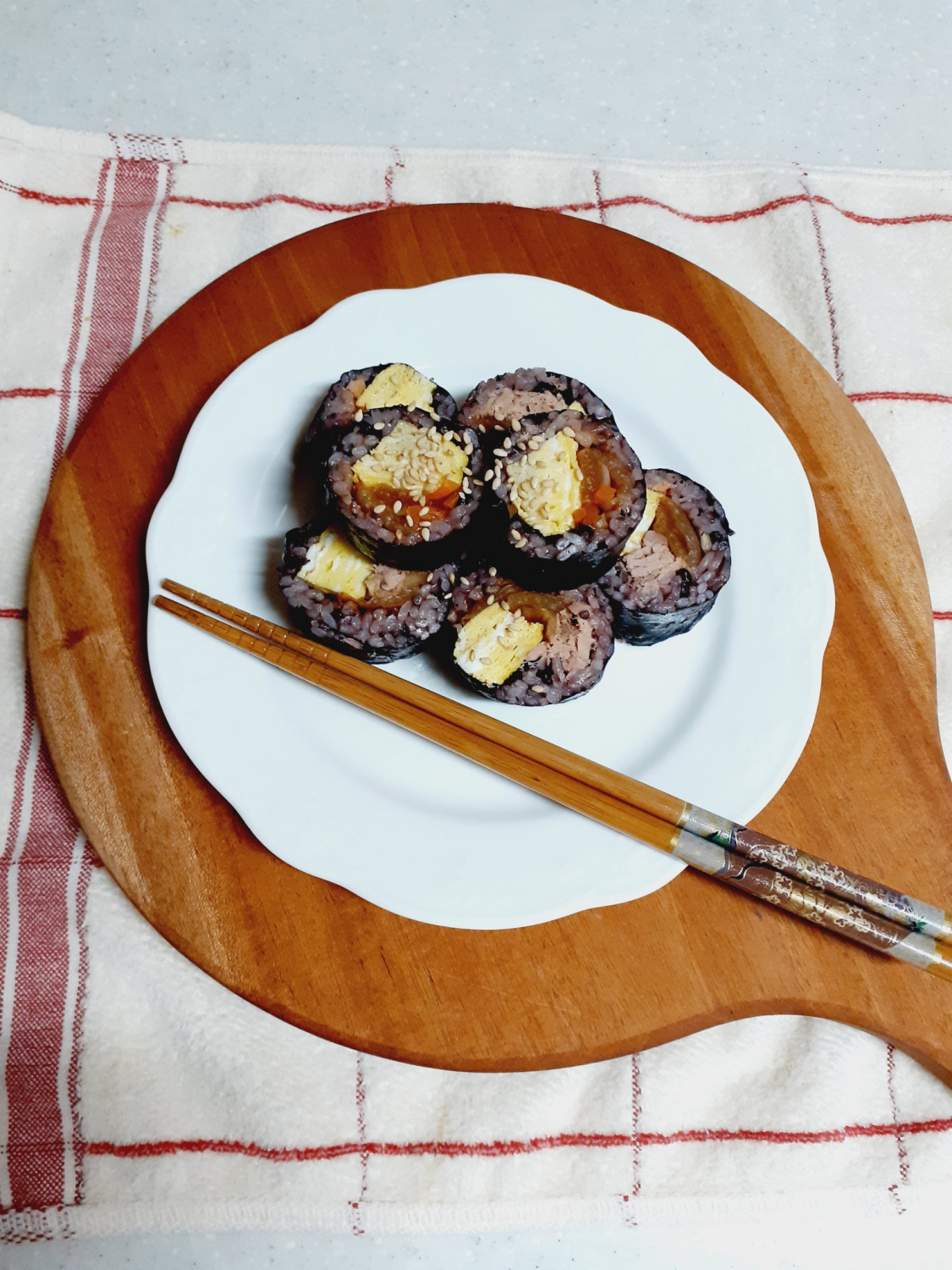Special Aged Kimchi Kimbap (Mugeunji Kimbap)
Popular and Flavorful Aged Kimchi Kimbap Recipe

This Aged Kimchi Kimbap is a delightful dish where the rich flavor of well-fermented kimchi meets fresh ingredients. Each grain of rice is infused with umami, making it perfect for special occasions or a quick meal or snack. The refreshing tang of the aged kimchi cuts through any richness, creating a wonderfully addictive kimbap.
Main Ingredients- 10 sheets of kimbap seaweed (gim)
- Generous amount of warm rice
- 1/4 head of well-fermented aged kimchi (mugeunji)
- 1/2 onion
- 250g can of tuna
- 9 fresh eggs
- 1/4 carrot
- A little cooking oil
Seasoning & Stir-fry Ingredients- A little sesame oil
- 1.5 Tbsp granulated sugar or regular sugar
- 3 pinches of sea salt
- 1/3 Tbsp soy sauce
- A little sesame oil
- 1.5 Tbsp granulated sugar or regular sugar
- 3 pinches of sea salt
- 1/3 Tbsp soy sauce
Cooking Instructions
Step 1
Thoroughly remove the inner filling from the aged kimchi and cut it in half. This step helps to reduce any bitterness from the kimchi.

Step 2
Cut the thick stem parts of the aged kimchi lengthwise into strips that are easy to use as a filling. If the stems are too thick, they can be difficult to bite into, so aim for a moderate thickness.

Step 3
In a pan, combine the sliced onion, 1/2 Tbsp of sugar, and 5 Tbsp of water. Sauté over medium heat. Using chicken or vegetable broth instead of water can add a deeper flavor.

Step 4
Once the onions become translucent and most of the water has evaporated, turn off the heat, drizzle in a little sesame oil, and mix well to finish the sautéed onions. This process enhances the sweetness and aroma of the onions.

Step 5
Crack 3 eggs into a bowl, add 1/4 Tbsp of sugar and a pinch of sea salt. Whisk gently, avoiding creating too much foam, until evenly combined. Ensuring thorough mixing is key.

Step 6
Lightly grease a pan with cooking oil and wipe it with a paper towel, or preheat it over low heat. Pour in about 1/3 of the egg mixture and tilt the pan to spread it thinly and widely, creating a thin egg crepe. The thinner the egg crepe, the softer the kimbap will be.

Step 7
Once the egg crepe begins to set, fold it. Pour in another 1/3 of the egg mixture, tilt the pan to spread it thinly, and then gently roll it up with the previously folded portion. Rolling in thin layers creates a better texture.

Step 8
Pour in the remaining egg mixture and spread it thinly. Roll it up together with the previously rolled egg crepes, aiming for a thick roll. You can add a little more cooking oil in between to prevent sticking and ensure an even, golden-brown color.

Step 9
Place the canned tuna in a sieve to drain out all the oil completely. Removing the tuna’s oil prevents the kimbap from tasting greasy and ensures a clean flavor.

Step 10
In a separate pan, heat a little cooking oil and stir-fry the julienned carrots. Once the carrots are slightly tender, add 2-3 Tbsp of water, cover, and cook until the water evaporates. Then, add 1/3 Tbsp of soy sauce and stir-fry briefly to let the flavors meld. This method brings out the sweetness of the carrots.

Step 11
Slice the prepared and cooled egg crepes lengthwise into strips suitable for kimbap. Slicing them too thinly might cause them to break, so cut them into a moderate thickness.

Step 12
Add sesame oil and a pinch of sea salt to the warm rice and mix thoroughly. Use a spatula to gently mix, ensuring the rice grains remain distinct for a better texture.

Step 13
Place a sheet of kimbap seaweed on a bamboo mat, with the rough side facing up. Spread the seasoned rice thinly over the seaweed. Using too much rice can cause the kimbap to burst, so a thin layer is important.

Step 14
Arrange about 4-5 sheets of the prepared aged kimchi on top of the rice. You can adjust the amount of kimchi to your preference.

Step 15
Neatly place the julienned egg crepes and the stir-fried carrots on top of the kimchi. Considering the color combination will make your kimbap look even more appealing.

Step 16
Finally, add the drained tuna and roll the kimbap tightly using the bamboo mat. Gently press some rice grains along the edge of the seaweed to seal the roll securely.

Step 17
Cut the finished kimbap into bite-sized pieces. Lightly moistening your knife with water or cooking oil will help you cut the kimbap cleanly.

Step 18
Your Aged Kimchi Kimbap is ready! It boasts a refreshing and clean taste, thanks to the spicy and crunchy aged kimchi, without any greasiness. Enjoy the rich flavors combined with fresh ingredients!



